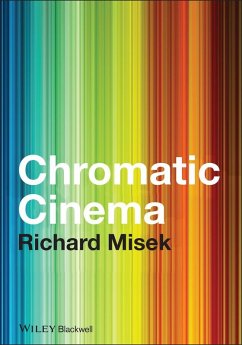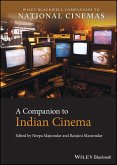Dieser Download kann aus rechtlichen Gründen nur mit Rechnungsadresse in A, B, BG, CY, CZ, D, DK, EW, E, FIN, F, GR, HR, H, IRL, I, LT, L, LR, M, NL, PL, P, R, S, SLO, SK ausgeliefert werden.
"An invigorating critical intervention into the history,theory and aesthetic analysis of colour in the cinema." (JENNIFER M. BARKER, Screen, August 2012)
"Chromatic Cinema provides a wealth of information and ofexamples of different approaches to colour in cinema and stimulatesenough thoughts and reflections to be a worthy addition to anylibrary on colour in cinema." (NICOLA MAZZANTI,Historical Journal of Film, Radio and Television, April2012"Chromatic Cinema is an excellent critical history of screen colourby Richard Misek, who teaches at the University of Bristol, nearwhich, as I recall, is a plaque to mark the birthplace of WilliamFriese-Greene, the somewhat unfortunate British movie pioneer, oneof who patents was for his own colour system." (Times LiterarySupplement, 25 November 2011)
"The book touches on most of the important aspects of colorcinema-from history to technology to ideology-and serves as anorientation course for a complex subject. It's a gateway read,neither intimidating nor frustrating. For a beginner (like me), itpresented a smattering of philosophical ideas, a grounding in thewhy and how progression of color use, and a primer on the scienceof color technologies." (MUBI, September 2010)"This remarkable manuscript opens new vistas on what cinema is, howit works, and what it can mean, with a deep historical perspectiveand an unobtrusive but effective deployment of film theory. It isbound to be a major intervention in an exciting and growing fieldof film studies, and a significant contribution to technologystudies." Sean Cubitt, author of The Cinema Effect
"Drawing on optical theory, art history, and film technology,Richard Misek rejects conventional distinctions between color andblack-and-white, arguing instead for a 'chromatic cinema' whichsees color everywhere. Original, thought-provoking,and sure to be controversial." Richard Koszarski, RutgersUniversity
"In this important and surprising study of cinema's mostcentral, seemingly simple, and notorious opposition--black andwhite versus color--Misek upsets the usual categories forunderstanding the development of cinema as technology and aestheticpractice. Chromatic Cinema should change the way we understand theso-called evolution of film style as the triumph of realism."Brian Price, Oklahoma State University
"The best color history with examples from Hollywood, theEuropean Art Film, Asia and Eastern Europe, Chromatic Cinemamoves from the early period to the advent of the digital, byarguing that the use of black and white must be discussed in thecontext of an ever-changing chromatic image. An indispensable textfrom the introductory to the advanced level, Richard Misekdialogues with art history and philosophy, with cultural historyand economics." Angela Dalle Vacche, Georgia Istitute ofTechnology









